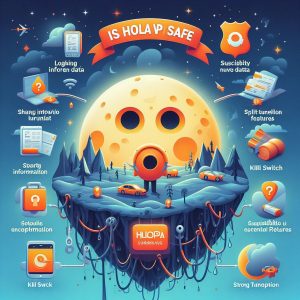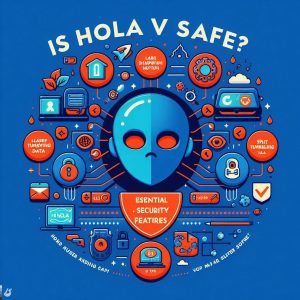As one of the most popular free VPN services, Hola VPN tempts users with free and unlimited access to its services. But with online privacy becoming increasingly valuable, does opting for a free VPN like Hola VPN compromise your security? This analysis of Hola VPN’s features attempts to answer the key question – is Hola VPN safe for users?
Security Features
On paper, Hola VPN checks the boxes on standard security protocols used by paid commercial VPNs:
Encryption Hola VPN uses 256-bit AES encryption to secure traffic between devices and VPN servers, matching industry standards. AES-256 is a military-grade protocol resistant to brute force decryption attempts.
Additional Protection The provider also claims to offer an internet kill switch that blocks internet access if the VPN connection unexpectedly drops. This prevents exposing your real IP address mid-session.
However, independent user testing reveals Hola VPN’s apps lack an actual functioning kill switch built-in. This oversight erodes trust in its security promises right away.

Security Risks
While the usage of AES-256 encryption seems reassuring, deeper analysis uncovers worrying security shortcuts that expose users:
Peer-to-peer VPN Unlike typical VPNs that funnel user traffic via designated servers, Hola VPN operates as a peer-to-peer network. User devices directly connect each other to route traffic rather than it flowing encrypted end-to-end to private servers.
No details on VPN protocol
Hola VPN also fails to clarify what VPN protocol its network runs on. Protocols like OpenVPN and IKEv2 are time-tested industry standards that power top commercial VPNs.
Proxy servers not VPN servers Further user testing confirms Hola VPN is functioning as a web proxy service instead of a proper virtual private network. Traffic flows through proxy tunnels rather than encrypted VPN tunnels. This leaves data unprotected against snooping or leaks.
No encryption of clear text information
Being a proxy service also means Hola does not encrypt DNS requests sent unencrypted in clear text. This exposes queries to DNS manipulation or tracking attacks.
Leak risks & public IP exposure Independent tests find that Hola exposes users to IPv6 traffic leaks, DNS leaks and WebRTC leaks that reveal the public IP address. This completely compromises the VPN protection.
Activity & connection logging While claiming a zero-logs policy, researchers found Hola VPN’s plugins actively log user activity including browsing history and transmit details unencrypted back to servers. This poses a blatant privacy violation.
Open to exploit by other users As a peer-to-peer service, experts warn Hola VPN infrastructure can also be exploited by bad actors to remotely access devices of random unwitting users.
Selling user bandwidth
Hola VPN’s business model also capitalizes on selling unused bandwidth of free users to premium subscribers. This raises ethical concerns and security risks from having unfamiliar traffic routed through your IP address or device by default.

Privacy Concerns
With myriad security deficiencies identified, Hola VPN unsurprisingly garners low confidence among privacy advocates as well:
Intrusive privacy policy
Hola VPN’s privacy policy aggressively collects multiple categories of user information without anonymization:
- Personally identifiable information
- Financial and payment information
- Authentication and access information
- Personal communications
- Browsing history
- Online user activity and connection logs
No guaranteed anonymity Experts conclude the application does not function like an actual VPN. Instead it routes traffic through a peer-to-peer network with no guaranteed encryption or anonymity. Your data and real IP address can still get exposed losing all privacy.

Recommendations
In light of the troubling revelations on Hola VPN’s security loopholes and privacy intrusiveness, I strongly advise against using this service as your VPN solution.
Experts overwhelmingly push users to only trust premium and reputable VPN providers that offer guaranteed protection. For your online security needs, recommended alternatives would include:
NordVPN – based in Panama, NordVPN has a strict no-logs policy coupled with advanced security features like multi-hop VPN chains and Tor-over-VPN access. It uses next-gen WireGuard protocol and scores highly on independent privacy and audit tests.
SurfShark – this British Virgin Islands-based provider also passed independent security audits with flying colors. It operates a huge fleet of 3200+ private servers using AES-256 encryption and offers a 30-day money back guarantee for added peace of mind.
So reject roulette odds of relying on free services like Hola VPN. Investing in a proven premium VPN like NordVPN or Surfshark is the only way to guard your internet footprint with confidence moving forward.
In closing, while the idea of accessing free and unlimited VPN protection seems enticing, pragmatic analysis confirms corner-cutting services like Hola VPN cannot back up tall security claims with actual anonymous encryption. Using them only gambles away users’ online privacy and exposes their network connections to risk. Opt for trustworthy paid platforms for guaranteed safety instead of playing Russian Roulette with free VPNs.